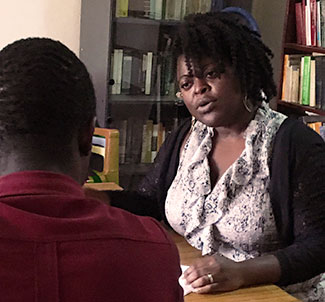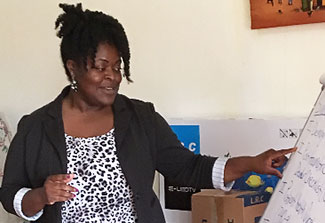Profile: Fogarty Fellow Dr Gilberte Bastien tackles Ebola's unseen mental scars in Liberia
March / April 2017 | Volume 16, Issue 2

Photo courtesy of Dr. Gigi Bastien
“As humanitarians, Americans have to ask themselves: if we can make even a small impact against illnesses or disasters that wreak havoc in far-flung places like Liberia and closer to home, like in Haiti, why would we stand by and not do anything?”
Dr. Gigi Bastien
Fogarty Fellow in Liberia
Two years after Ebola killed his entire family, a young Liberian finally met with the first health care professional to speak with him about the invisible, psychological scars the disease has left him with. That person was Fogarty Global Health Fellow, Dr. Gilberte "Gigi" Bastien.
"Ebola took his mother, father, siblings, aunts, uncles," Bastien said. "In the space of a few months, this young man's entire support network was completely obliterated by Ebola, and he told us that not a day goes by that he doesn't think about taking his own life."
The man, in his early 20s, had himself contracted Ebola but survived. His physical health has been followed up regularly through an Ebola medical treatment study, but until Bastien and her team asked him to respond to survey questions about the psychological impacts of Ebola on survivors, no one had inquired about his mental health, Bastien said. The young man told them that he wonders every day "why he's still here when his family's all gone" and grapples with being shunned by his community "where people think they might catch Ebola if he so much as looks at them," Bastien said. He's had to deal with his grief, stigmatization and suicidal thoughts on his own - until now.
In September 2016, Bastien arrived in Liberia, which lost nearly 5,000 people to Ebola during the outbreak, beginning in 2014. Supported by a Fogarty fellowship, the researcher from the Morehouse School of Medicine stood up a project to improve understanding of the mental health and psycho-social challenges facing communities and individuals affected by Ebola, and map out ways for low- and middle-income countries to provide care following a large-scale health emergency or natural disaster.
Before heading to Liberia, Bastien's grant from Fogarty allowed her to visit NIH, where she met the directors of several Institutes and Centers, gained new insights and received training in research methodologies. Once in Liberia, Bastien recruited and trained six locals to work with her as research assistants and focus group facilitators. She devised short courses for them, covering everything from data entry to research ethics to the logistics of field operations, and deployed the newly minted researchers to administer surveys and hold focus groups. These targeted burial teams who helped dispose of the bodies of Ebola victims, military personnel involved in the response, health workers who staffed Ebola treatment units and communities ravaged by the disease.
"By exposing Liberians to the research process and giving them an idea of how to make sense of data, and, importantly, how to circle back and engage the communities by sharing what they've learned in a socially responsible and culturally informed way, we're equipping them to be prepared now and for Liberia's next crisis," said Bastien.
Although small in monetary terms, the support Bastien received from Fogarty "can't be overstated, especially in a place like Liberia where there's huge need alongside sorely inadequate resources," she said. Fogarty funding allowed Bastien to base herself in Liberia and "really feel the burden of the Ebola outbreak on people and communities," she said. "There's a big difference between seeing the faces of Ebola survivors and responders on a screen in Atlanta and actually speaking with them face-to-face."

Photo courtesy of Dr. Gigi Bastien
The Fogarty-supported work Bastien and her team have done will resonate far beyond the West African country, the clinical psychologist from Morehouse Medical School predicted. "When we prove the validity and strength of the interventions and constructs we deploy in challenging settings, we demonstrate the potential they have in places like the U.S.," she said.
"In countries where communities have been devastated, both in terms of physical and mental health, by diseases like Ebola, the impact of having the resources needed and the funding to conduct research and build capacity is palpable. Our research is also relevant to people in America because borders are beginning to be nonexistent - people and illnesses move easily from one place to another."
Moral and national security arguments also advocate for the U.S. to continue in its leadership role in global health research, Bastien said. "As humanitarians, Americans have to ask themselves: if we can make even a small impact against illnesses or disasters that wreak havoc in far-flung places like Liberia and closer to home, like in Haiti, why would we stand by and not do anything? If we measure the accomplishments of global health projects with the same yardstick as national security successes - by what they prevent - then we see that years of investment in global health have created a buffer that's kept the U.S. protected from diseases and conditions that remain huge challenges and claim many lives in resource-poor countries like Liberia."
More Information
To view Adobe PDF files,
download current, free accessible plug-ins from Adobe's website.